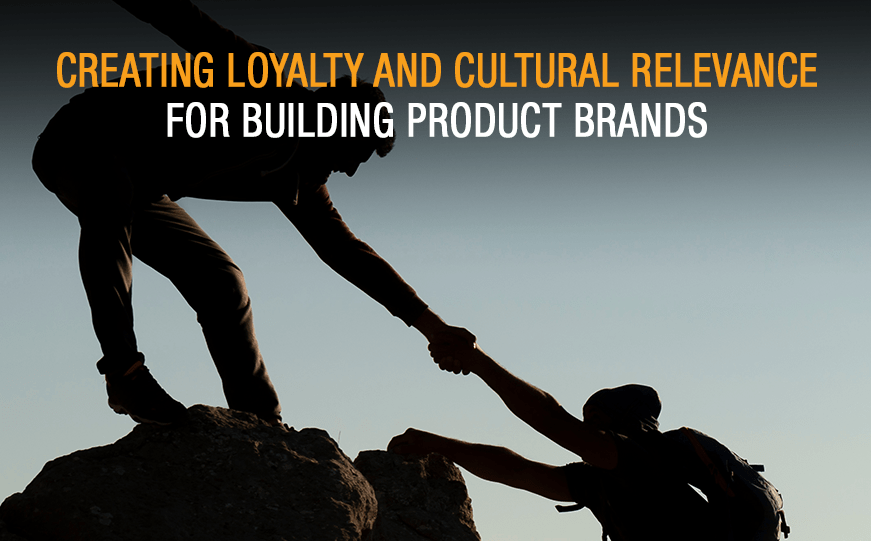Now more than ever, building product brands face a unique challenge: remaining both culturally relevant – and indispensable – to audiences.
As expectations continue to grow, communities will demand more than mere functional solutions. Instead, top prospects will seek to forge authentic connections that reward loyalty… and which resonate with their own values. This shift is particularly critical in building material sales, where long-term partnerships are the backbone of success.
By adopting a community-focused approach, brands can build stronger relationships – while fostering trust and achieving a competitive edge – in the market.
Defining Loyalty and Cultural Relevance
Loyalty and cultural relevance are twin pillars of modern marketing. Loyalty is rooted in consistent value, trust and meaningful engagement. While cultural relevance reflects a brand’s ability to align with its audience’s beliefs, values and priorities.
For B2B companies – especially those marketing to home builders – achieving both is essential for establishing enduring relationships.
In the building products sector, loyalty is born by delivering consistent quality and reliability.
To grow the value of their intimate relationships, contractors, architects and developers will continue to specify the type of products that they can truly trust. In an increasingly crowded marketplace… cultural relevance offers a way to stand out. By addressing broader trends – such as sustainability, diversity and community-driven development – brands must position themselves as more than mere suppliers.
Only then, can they become partners… in their clients’ success.
Leading brands take cultural relevance seriously. Whether positioning their appeal to a specific demographic – or connecting with a particular affinity group – relating along cultural lines can be challenging. After all, there’s a potential trust-divide to cross… from shameless pandering. And towards achieving authenticity.
A recent story in ProBuilder promoting the rate of Hispanic homeownership may well stimulate a goal for outreach to that demographic. Yet, it’s critically important for brands to recognize that the Hispanic market – like all targeted audiences – mustn’t be approached with broad strokes. Or a one-size-fits-all approach. This kind of marketing requires a sensitive and deft touch.
As a case in point… we’ve written a white paper about effective marketing to Hispanic audiences and you can download it here.

Why Community Matters
Community engagement is the foundation of both loyalty and cultural relevance. Brands that prioritize community – also pledge their commitment – to shared growth and success. This is particularly important in the building products industry… where projects often can span years.
And relationships must withstand the test of time.
Connecting with professional communities involves understanding the challenges and opportunities faced by contractors, architects and developers. For instance, brands that champion sustainable practices or offer professional development opportunities gain credibility and trust within these circles. Authentic engagement builds a sense of partnership… which is vital for brands employing challenger marketing strategies to differentiate themselves from industry leaders.
Armstrong World Industries, a leader in ceiling solutions, is an example. By prioritizing sustainability and collaborating with architects to create healthier environments, Armstrong demonstrates how a focus on community enhances cultural relevance. Their initiatives – such as the Healthy Spaces program – align with the growing emphasis on eco-friendly design. Establishing a highly differentiated “brand promise” as a partner… in the transition toward more sustainable building practices.
Community Engagement Strengthens Loyalty
Loyalty in the building products sector extends well beyond consistent performance. Rather, affinity is built on the relational dynamics between brand reputations… and their professional audiences. Brands that actively engage with their communities – cultivate deeper loyalty – by demonstrating a commitment to shared success.
USG Corporation exemplifies this principle. Through its partnerships with organizations like the Association of General Contractors, USG reinforces its connection to the contractor community. These long-standing relationships not only enhance loyalty – but also position the company as a vital contributor – to the success of its partners. By supporting professional development and certification programs, USG showcases how prioritizing community engagement fosters trust and builds lasting loyalty.
Integrating Cultural Relevance into Marketing Plans
To incorporate cultural relevance effectively, building product brands must align their marketing strategies with the values and concerns of their target audience communities. This effort goes beyond expected gestures – and instead, requires active participation – in meaningful industry movements.
- Understand Cultural Trends: Leverage available market research to identify the cultural trends shaping buyer journeys and behaviors. For example, the growing demand for environmentally conscious materials – and inclusive design practices – offers opportunities to lead these movements.
- Highlight Shared Values: Campaigns should emphasize building “bridges of values” between the brand and its audiences. Whether through thought leadership on green building practices – or sponsorship of industry events – showcasing shared priorities, strengthens connections.
- Forge Strategic Partnerships: Collaborating with organizations that champion sustainability – or cultivate training and recruiting programs – reinforces a brand’s authenticity. These partnerships should be long-term commitments… to ensure that they will continue to resonate with target audiences.
- Develop Authentic Messaging: Marketing must reflect both functional benefits and cultural priorities. Whether through website content, social media campaigns, or regional activations… authentic messaging highlights a brand’s community sensitivity.
- Adapt to Evolving Values: Cultural relevance cannot remain static. Regularly engaging with community feedback – and reassessing priorities – allows brands to remain highly aligned despite evolving trends.
Best Practices for Building Loyalty and Cultural Relevance
- Engage in Community Initiatives: Support programs that address industry challenges… such as educational workshops or sustainability projects. These efforts build trust. And enhance credibility.
- Leverage Industry Trends: Stay informed about emerging trends, such as eco-friendly construction and inclusive design. Positioning brands as leaders in these areas, helps to create differentiation.
- Cultivate Authentic Partnerships: Align with groups and organizations that share a brand’s values. For example, partnering with sustainable building coalitions demonstrates commitment to environmental stewardship.
- Showcase Commitment: Authenticity requires action. Brands like Armstrong and USG thrive because their initiatives extend beyond marketing… to real-world impact.
In building material sales, prioritizing community and cultural relevance is no longer optional. By aligning with the values – and priorities of architects, contractors and developers – brands can secure loyalty and establish themselves as trusted partners through community engagement.
If you’re interested in maintaining cultural relevance and building more engaged communities, we’re here to help. Send an email to Steve at sk@kleberandassociates.com to get the conversation started.





